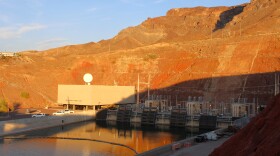-
Drought and steady demand along the Colorado River are draining the nation's second-largest reservoir. Land that was once submerged is now full of beavers and thriving ecosystems.
-
Southwest utilities are diversifying their electricity assets.
-
A group of nonprofits is calling for reductions to water demand, changes at Glen Canyon Dam and more transparent negotiations.
-
Adult zebra mussels were recently discovered in the Colorado River and a nearby lake in Grand Junction on the Western Slope. Wildlife officials have officials designated that area of the Colorado River as “infested.” Shannon Mullane is a reporter for the Colorado Sun . She discussed zebra mussels with KUNC's Desmond O'Boyle
-
Ted Cooke had been tapped to run the Bureau of Reclamation, but withdrew as some Upper Basin states worried about potential bias.
-
A new film in theaters today tells a story about the Colorado River we don’t often hear – that of the plants and animals that rely on its water. The film also incorporates Indigenous perspectives. The director of the film set out to make a vivid portrait of life in the Colorado River Basin.
-
A new report from the Bureau of Reclamation shows water levels in Lake Powell and Lake Mead, the Colorado River's two largest reservoirs, remain low. It predicts those conditions could continue or worsen over the next two years. CU Boulder's Chris Winter says this should spur the seven states in the basin to come to an agreement on new operating guidelines for the future.
-
The move, by the Colorado River Indian Tribes in Arizona and California would give rights of nature to the water, marking a historic first.
-
Zebra mussel larvae were recently detected in the Colorado River. What does that mean for the 40 million people who depend on the river for drinking water and agriculture in Western states? And what can the state do about it?
-
The cash will allow work in fire-damaged watersheds and the Kawuneeche Valley in Rocky Mountain National Park to continue. Listen to "Morning Edition" host Michael Lyle, Jr. discuss this story with Colorado Sun publisher Larry Ryckman and then read The Colorado Sun story at the link below.

Play Live Radio
Next Up:
0:00
0:00
Available On Air Stations










